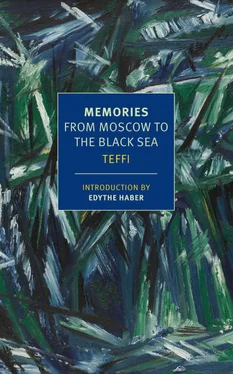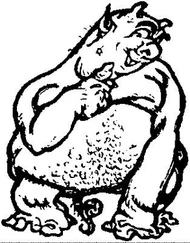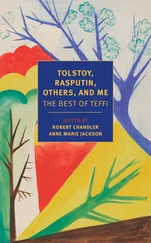Teffi
MEMORIES
FROM MOSCOW TO THE BLACK SEA
Translated from the Russian by
Robert and Elizabeth Chandler,
Anne Marie Jackson, and Irina Steinberg
Introduction by
Edythe Haber
BEFORE A MAP OF RUSSIA
In a strange house, in a faraway land,
her portrait hangs on the wall;
she herself is dying like a beggar woman,
lying on straw, in pain that can’t be told.
But here she looks as she always did look:
young, rich, and draped
in that luxurious green cloak
in which she was always portrayed.
I gaze at your countenance as if at an icon…
“Blessed be your name, slaughtered Rus!”
I quietly touch your cloak with one hand;
and with that same hand make the sign of the cross. [1] A longer version of “Before a Map of Russia” was published in Vozrozhdenie (Oct. 2, 1925). This shorter version was published in the almanac Na zapade (New York, 1953). The present translation first appeared in The Penguin Book of Russian Poetry (Penguin, 2015), ed. Chandler, Dralyuk, and Mashinski.
—TEFFI
translated by Robert Chandler
TEFFI, commenting in 1918 on the savage civil war that was decimating the Russian Empire in the wake of the October 1917 Revolution, put the blame squarely on the devil. Russia had improbably held together for so many centuries, she wrote:
But suddenly some wily devil poked his stick somewhere near Moscow and began spinning Russia like a whirlwind top. “Whee-ee-ee!” The pieces are flying in various directions like sparks. The Crimea! The Caucasus! Poland! Little Russia! Lithuania! Finland! The Baltic region! Siberia! Kazan! Whee-ee-ee! More! More! Cities! Seas! Kingdoms! Principalities! Free lands! More! More! Soon only the stick will remain… [1] “Retrospektivnyi vzgliad i udivlenie,” Novyi Satirikon , no. 6, (Mar), 1918: 13. Rep. in Teffi, V strane vospominanii. Rasskazy i fel’etony 1917–1919 , ed. S. I. Kniazev & M. A. Rybakov (Kiev: LP Media, 2011), 164.
Teffi was at the time one of the most widely read and beloved of Russia’s writers. As one émigré commenter asserted: “There was scarcely ever another writer in Russia who had such an enormous circle of readers as Teffi.” He added that, although she published almost exclusively in the liberal press, “both Russias” read her and she was a favorite of the last tsar, Nikolai II [2] M[ark] A[ldanov], “Teffi. Passiflora ,” Sovremennye zapiski , 1923, no. 17: 485.
(as she was of his Bolshevik successor, Vladimir Lenin). Her celebrity reached such heights that there even existed Teffi Perfume and Teffi Candies.
Teffi (pseudonym of Nadezhda Alexandrovna Lokhvitskaya) was born in 1872 into a distinguished St. Petersburg family. Her father, Alexander Lokhvitsky, was a professor of law and much published writer both in the academic and popular press, who, after the legal reforms of Tsar Alexander II in the 1860s, became a celebrated criminal lawyer. Teffi noted that he was “renowned for his wit”—a gift inherited by his daughter. [3] “Nadezhda Teffi,” in F. F. Fidler, ed., Pervye literaturnye shagi: Avtobiografii sovremennykh russkikh pisatelei (Moscow: I. D. Sytin, 1911), 203.
The second youngest of six children (five girls and one boy), she recalled that all her siblings wrote poetry [4] Teffi, “Chuchelo,” Vozrozhdenie , Jan. 11, 1931 (no. 2049): 2.
—and no less than four of the sisters became professional writers. One of them, Mirra Lokhvitskaya, achieved renown as a poet before her early death in 1905. Known as the Russian Sappho, she introduced unbridled female sexuality into Russian poetry and had close ties to the decadents and Symbolists. The only boy, Nikolai, pursued a military career and during World War I led the Russian expeditionary force to France, rising to the rank of lieutenant general.
Teffi’s own writing career was delayed by her short and unhappy marriage to Wladyslav Buczynski, a Polish graduate of the St. Petersburg Law School and a landowner. They wed around 1890 and separated less than a decade later when Teffi abandoned her family at her husband’s estate in the Mogilev Province (now in Belarus) and returned to St. Petersburg to pursue her literary calling. In 1901 her first publication—a serious poem that she herself judged “dreadful”—appeared under her maiden name, N. Lokhvitskaya. [5] “Mne snilsia son…,” Sever , 1901 (no. 35): 1101; Fidler, 204–5.
After publishing two more unexceptionable lyrical poems, at the end of 1901 her first satirical verses came out and for the first time she adopted the pseudonym Teffi. [6] Teffi, “Pokaiannyi den’,” Teatr i iskusstvo , 1901, no. 51 (Dec. 16): 955; “Novyi god u pisatelei,” Zvezda , 1901, no. 52 (Dec. 29): 14–16, 18.
For the next couple of years she signed her serious work with her real name—usually her married name, N. Buchinskaya—and her humorous pieces Teffi, but by 1904 she used her pseudonym exclusively.
By 1903 Teffi was reaching a broader audience, her feuilletons, stories, and verse (both satiric and serious) appearing regularly in the popular Petersburg newspaper, Birzhevye vedomosti (The Stock Exchange Gazette), as well as in other broad circulation newspapers and magazines. In 1907 her activities spread to the theater when her one-act play, The Woman Question , was successfully staged at St. Petersburg’s Suvorin Theater. [7] The play, “Zhenskii vopros,” has been translated by Elizabeth Neatrour as “The Woman Question: A Fantastical Farce in One Act,” in An Anthology of Russian Women’s Writing, 1777–1992 , ed. Catriona Kelly (Oxford: Oxford University Press, 1994): 174–92.
It was followed by many more theatrical miniatures, which enjoyed great popularity over the next decade in St. Petersburg, Moscow, and throughout the Russian Empire. In addition, Teffi’s talents extended to music. She wrote many songs—sometimes both words and music, at other times only the lyrics. These she sang to the accompaniment of her guitar (which she tenderly eulogizes in Memories ) and many became part of the repertoire of well-known performers.
It has been said that Teffi invented her own genre—“the feuilleton that got by without politics” [8] Aldanov.
—but this was not always the case. She, like many writers and intellectuals, actively supported the 1905 Revolution and she had quite close ties to the Bolsheviks. In March 1905, her poem “Banner of Freedom” (later entitled “The Bees”) came out in the Geneva Bolshevik newspaper, Vpered (Forward). [9] “Znamia svobody,” Vpered , Mar. 2 (15), 1905. Pub. as “Pchelki” in Novaia zhizn’ , no. 2 (1905) and in Teffi’s collection of poetry, Sem’ ognei (Spb.: Shipovnik, 1910), 57–58.
In October, after the tsar issued his manifesto guaranteeing certain civil liberties including freedom of the press, Teffi wrote for the first legal Bolshevik newspaper allowed in Russia, Novaia zhizn’ (New Life). The newspaper’s literary contributors included a diverse collection of contemporary writers, ranging from the Symbolist Konstantin Balmont, to the realist Ivan Bunin, to the revolutionary Maksim Gorky, but Teffi was more deeply involved than most. She served as one of three non-Party members on the editorial board, who all, according to one of the Bolshevik participants, “made themselves out at the time to be Marxists or Marxist-leaning [ marksistvuiushchikh ].” [10] I. Gukovskii, “Iz vospominanii I. E. Gukovskogo,” Novaia zhizn’: Pervaia legal’naia S.-D. bol’shevistskaia gazeta, 27 oktiabria—3 dekabria 1905 goda , ed. M. Ol’minskii, vyp 1, no. 1–7 (Leningrad: Rabochee izd. “Priboi”, 1925), x.
Читать дальше












